Hyundai Tucson: Installing a Child Restraint System / Securing a Child Restraint System seat with Tether Anchor system
.png)
First secure the child restraint with the LATCH lower anchors or the seat belt. If the child restraint manufacturer recommends that the top tether strap be attached, attach and tighten the top tether strap to the top tether strap anchor.
Tether anchors are located on the rear of the seatbacks.
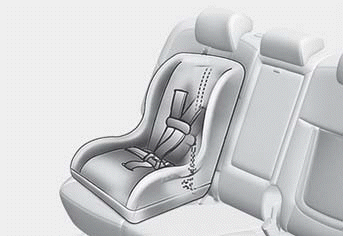
To install the tether anchor:
1. Route the Child Restraint System top tether strap over the seatback. Route the tether strap under the head restraint and between the head restraint posts, or route the tether strap over the top of the vehicle seatback. Make sure the strap is not twisted.
2. Connect the tether strap hook to the tether anchor, then tighten the top tether strap according to the instructions of your Child Restraint System’s manufacturer to firmly secure the Child Restraint System.
3. Check the Child Restraint System is secure by pushing and pulling the seat forward and back and side-to-side.
WARNING
Take the following precautions when installing the top tether:
- Read and follow all installation instructions provided with your Child Restraint System.
- Never attach more than one Child Restraint System to a single tether anchor. This could cause the anchorage or attachment to come loose or break.
- Only attach the tether strap to the correct tether anchor for that seating position.
- Make sure that the Child Restraint System anchors withstand the combined weight of the child and the child restraint system of less than 65 lbs. (30 kg) for each LATCH system. Do not use them for adult seat belts, harnesses, or for attaching other items or equipment to the vehicle.
Securing a Child Restraint System with a lap/shoulder belt
WARNING
Always place a rearward-facing Child Restraint System in the rear seat of the vehicle.
Placing a rearward-facing child restraint in the front seat may result in serious injury or death if the Child Restraint System is struck by an inflating airbag.
When not using the LATCH system, all Child Restraint Systems must be secured to a rear seat using the lap/shoulder belt.
Automatic locking mode
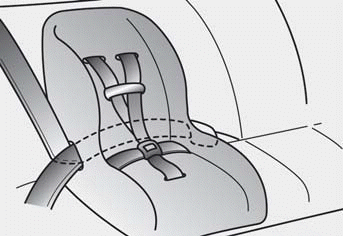
Since all passenger seat belts move freely under normal conditions and only lock under extreme or emergency conditions (emergency locking mode), you must manually pull the seat belt all the way out to shift the retractor to the Automatic Locking mode to secure a Child Restraint System.
The Automatic Locking mode will help prevent the normal movement of the child in the vehicle from causing the seat belt to loosen and compromise the Child Restraint System.
To install a Child Restraint System on the rear seats:
1. Place the Child Restraint System on a rear seat and route the lap/shoulder belt around or through the Child Restraint System, following the Child Restraint System manufacturer’s instructions. Make sure the seat belt webbing is not twisted.
Information
When using the rear center seat belt, refer to the "Passenger and Rear Seat Belts – 3point system with convertible locking retractor" section in this chapter.
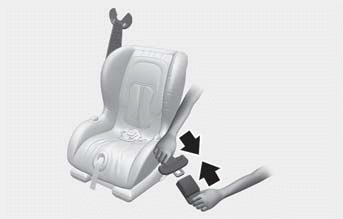
2. Fasten the lap/shoulder belt latch into the buckle. Check a distinct “click” sound is heard.
Information
Position the release button so it is easy to access in an emergency.
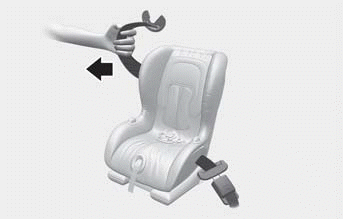
3. Pull the shoulder portion of the seat belt all the way out. When the shoulder portion of the seat belt is fully extended, it shifts the retractor to the Automatic Locking (child restraint) mode.
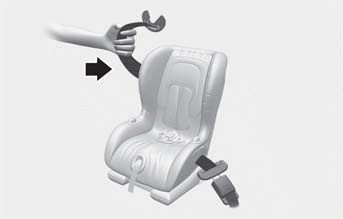
4. Slowly allow the shoulder portion of the seat belt to retract and listen for an audible "clicking" or "ratcheting" sound. This indicates that the retractor is in the Automatic Locking mode. If no distinct sound is heard, repeat Step 3 and 4.
5. Remove as much slack from the belt as possible by pushing down on the Child Restraint System while feeding the shoulder belt back into the retractor.
6. Push and pull on the Child Restraint System to confirm that the seat belt is holding it firmly in place. If it is not, release the seat belt and repeat Step 2 through 6.
7. Double check that the retractor is in the Automatic Locking mode by attempting to pull more of the seat belt out of the retractor. If you cannot, the retractor is in the Automatic Locking mode.
If your Child Restraint System manufacturer instructs or recommends you to use a tether anchor with the lap/ shoulder belt, refer to the previous pages for more information.
Information
When the seat belt is allowed to retract to its fully stowed position, the retractor automatically switches from the Automatic Locking mode to the emergency lock mode for normal adult usage.
WARNING
Make sure that the retractor is in the Automatic Locking mode. Otherwise, the child restraint may move when your vehicle turns or stops suddenly. A child may be seriously injured or killed if the child restraint is not properly anchored in the vehicle including manually pulling the seat belt all the way out to shift the retractor to the Automatic Locking mode.
To remove the Child Restraint System, press the release button on the buckle and then pull the seat belt out of the Child Restraint System and allow the seat belt to retract fully.
 Securing a Child Restraint System
with the LATCH Anchors System
Securing a Child Restraint System
with the LATCH Anchors System
To install a LATCH-compatible Child
Restraint System in either of the rear
outboard seating positions:
1. Move the seat belt buckle away from
the lower anchors.
2. Move any other objects away ...
 Supplemental Restraint System - Airbags
Supplemental Restraint System - Airbags
1 Driver’s front airbag
2 Passenger’s front airbag
3 Side airbag
4 Curtain airbag
Your vehicle is equipped with a Supplemental Airbag System for the driver’s
seat and
front passenge ...
Other information:
Hyundai Tucson (NX4) 2022-2026 Service Manual: Trailing Arm
- Removal
• When lifting a vehicle using a lift, be careful not to damage
the lower parts of the vehicle (floor under cover, fuel filter, fuel
tank, canister).(Refer to General Information - "Lift and Support
Points")
1.Loosen the rear wheel nuts slightly.Raise the v ...
Hyundai Tucson (NX4) 2022-2026 Owner's Manual: Seat Belt Restraint System
WARNING
Improperly positioned seat belts may
increase the risk of serious injury in an
accident. Take the following precautions
when adjusting the seat belt:
Position the lap portion of the seat
belt as low as possible across your
hips, not on your waist, so that it
fits snugly ...
